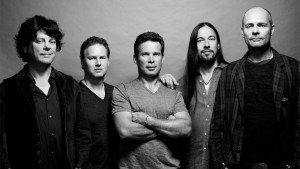There’s one thing about CMRRA Board Director and peermusic Canada Managing Director, Neville Quinlan, that stands out above all else – he really knows his stuff.
It’s the kind of innate knowledge that comes from having touched many sides of the music industry, first as a studio manager, then booking agent, and now at the helm of the Canadian office of the largest family-run independent music publishing company in the world.
Quinlan’s journey began across the pond after graduating from McGill University in Montreal with a degree in English Literature. He soon landed a position in the textiles department at Christie’s auction house in London. After a one-year stint he relocated to North London, on a whim, to run a music studio and equipment rental company.
It was there he fell in love with the music industry.
The experience he garnered working with musical acts in London helped Quinlan land a job as a booking agent with Courage Artists and Touring when he returned to Canada in the mid-nineties.
“Working in sales really was a great place to start,” said Quinlan. “You have to have real spirit, you really have to understand music, believe in it, and be able to negotiate all the time, every day, on behalf of bands who don’t have a lot of leverage.”
While he loved the rough-and-tumble agency world, its unpredictability eventually led Quinlan to an entry-level opening at peermusic’s Toronto office in 1999. He spent his early days at peermusic manually processing royalties and registering songs, a tedious task at a time before electronic file transfers existed.
“We were doing song registrations manually, writing letters, song titles, the shares and all of the interested parties,” explains Quinlan. “I really learnt a lot about copyright, about royalties, and general administration of a publishing company.”
Two years in, several of the company’s senior executives moved on to other roles simultaneously. All of a sudden Quinlan found himself in an empty office staring at a remarkable opportunity.
“I unplugged my computer, moved into the corner office, put my elbows out, and said I wanted to manage the office to the peermusic organization and that’s really how it started.”
A few months into his new role, The Song Corporation, a Canadian music company with incredibly valuable song-publishing copyrights, filed for bankruptcy on May 4, 2001.
“We recognized [this catalogue] as having such unbelievable value, not only as a company, as a business, but culturally,” says Quinlan. “We proposed to the bankruptcy trustee to split the masters and the publishing assets of Song Corp, and went after the publishing really hard.”
The acquisition process took almost two years.
“People talk about buying catalogues all the time and it seems like it’s this seamless process and really it’s nothing like that,” Quinlan revealed. “It was an incredibly long, complicated, emotionally draining process but it gave us time, as we’re sitting in court rooms and boardrooms trying to negotiate, to explain who we were and get to know a lot of the key writers.”
The result was a turning point for peermusic’s Canadian office, which up until that time had managed a fairly modest roster.
What a lot of people might not know about peermusic is that the company enjoys a wonderfully rich, colourful history, and has an expansive worldwide footprint with 32 offices in 28 countries.
Established in 1928 by visionary Ralph S. Peer and headquartered in New York, the company became a household name in the 1930s by introducing the world to the music of The Carter Family and Jimmie Rodgers, as well as diverse music from the U.S. and Central and South America.
According to Quinlan, the secret to peermusic‘s success is its stable structure, global reach, and staff longevity. In its 88 years of operation, there have only been three CEOs: founder Ralph Peer, his wife Monique, and their son, Ralph Peer II, at the helm today.
Quinlan heads up the sole Canadian peermusic office, and is supported by a team that includes a Director of Synchronization Licensing and Creative Manager and Office Manager/Copyright Administrator.
Together, they manage a roster of high-profile Canadian songwriters including grass-roots rock favourites The Tragically Hip, Sarah McLachlan, Hawksley Workman, Kathleen Edwards, Sebastien Grainger, Hannah Georgas, Voivod, The Stampeders, Crowbar, and Tino Zolfo.
They also administer catalogues for Music Sales, Jalma Music (Tom Waits), Beggars Music, Mothership Music (Epitaph), Schubert Music, Megatraxx, Cadence Music Group (formerly Maple Music), and Four Jays Music.
peermusic Canada signs between three and four songwriters every year, each one with a different need and expectation.
“Every songwriter is different and you have to really listen to them and really see what they’re doing and not always believe what they are saying but really understand the direction they are going in,” Quinlan said.
It’s a personal investment the company takes very seriously.
“There are some writers who all they need is a little bit of money and they don’t want to talk to you until the next year when they deliver a gazillion songs,” Quinlan explains, “and then there’s other ones who don’t need the money, they need the infrastructure, they need someone to help with everything from booking flights, setting up sessions, going out there and earning the money. Others just need administration.”
When adding new writers to their roster, peermusic typically starts by pitching song placements in film and television and developing strategies on how to work new material well in advance. It’s an approach that has served them well.
Quinlan joined the CMRRA Board of Directors in 2002. “I remember when CMRRA started their website. It felt revolutionary. I could actually look up a song, see what licenses had been issued, and see if they had been signed or not… it was super exciting and transparent,” said Quinlan. “CMRRA was really at the forefront of that and it was just a breath of fresh air.”
CMRRA prides itself on continually looking for avenues to innovate, increase transparency, and provide value to clients. Last month the agency launched an enhanced electronic royalty statement format via the CMRRA Direct portal to provide publisher clients with more detailed information on payments, works, and sound recording metadata.
Quinlan feels the CMRRA model is advantageous to music publishers and writers in Canada.
“You realize the way CMRRA works the way it does is because of an actual philosophy,” Quinlan says. “Things don’t happen by accident. There is very clever management and a board that allows them to proceed with flexibility and openness.”
In addition to his advisory role with CMRRA, Quinlan also sits on CMPA’s Board of Directors and recently served a board term with SOCAN.
When asked about the current state of the music publishing industry in Canada, he doesn’t hold back.
“This is a really, really exciting time to be in the music business because no-one, and I’m talking from the heads of companies down to people in the mailroom, knows what’s going to happen,” he said. “We have to fight and show how we are relevant.”
It’s a fight he’s determined to win.






